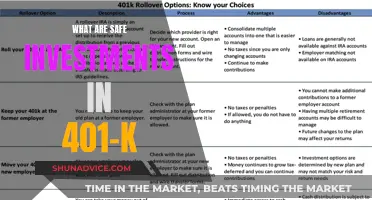
Investing is a common way to build wealth, but it doesn't always lead to riches. It requires discipline, consistency, and emotional discipline. While some people have become wealthy through investing, it often takes time and a substantial amount of initial capital. Starting early, staying in the market, and diversifying one's investments are key principles for successful investing. Compounding returns over time can significantly grow one's wealth, but it is important to remember that investing carries risks and does not guarantee positive returns.
| Characteristics | Values |
|---|---|
| Investing consistently | Compounding interest can help build wealth over time. |
| Diversifying investments | Diversification can help reduce risk and prevent huge losses in the market. |
| Starting early | The longer you invest, the more money you will have. |
| Maintaining appropriate risk | Avoid getting in on a hot new cryptocurrency or putting all your money on a historically well-performing stock. |
| Making consistent contributions | Set up automatic contributions to your brokerage account on a weekly or monthly basis. |
What You'll Learn

Start early and level up automatically
Starting early and levelling up automatically is one of the most agreed-upon pieces of financial advice. This is because compound interest is one of the most powerful ways to grow your money. When you invest, the money you put in earns interest, and those gains are added to your principal, so you earn interest on all of it, compounding your wealth over time.
The longer you invest, the more money you will have at retirement. The earlier you start, the more you can benefit from compounding. For example, if you invest $1,000 at 10% yearly compound interest, you will earn $100 at the end of the first year. At the end of the second year, both the original $1,000 and the $100 interest will earn compound interest. This process continues for as long as you want.
You can automate your investments by setting up automatic contributions from your paycheck to your company's 401(k) plan. This helps you get started and build the habit of investing. You can also set your contributions to automatically increase by 1% each year.
You can also invest a fixed dollar amount regularly, such as monthly or every time you get paid. This is called dollar-cost averaging. For example, you could invest $300 a month in an index fund of a broad range of stocks. When the value of the fund goes up, your $300 buys fewer shares, and when the fund price declines, your $300 purchases more shares. This smooths out your risk and allows you to develop a habit of investing no matter how much or little money you have.
Stress Testing Your Investment Portfolio: Strategies for Success
You may want to see also

Diversify your investments
Diversifying your investments is a crucial aspect of successful investing and can be summed up as "don't put all your eggs in one basket". The basic idea is that if one of your investments loses money, your other investments will balance out those losses. While diversification does not guarantee that your investments will not suffer if the market drops, it can improve the chances that you won't lose money, or that if you do, the loss will be smaller.
Spread the Wealth:
Don't put all your money in one stock or one sector. Consider investing in a range of companies across different industries. You can also invest in various asset classes, such as stocks, commodities, exchange-traded funds (ETFs), and real estate investment trusts (REITs).
Consider Index or Bond Funds:
Adding index funds or fixed-income funds to your portfolio can provide diversification and hedge against market volatility. Index funds track various indexes and aim to match the performance of broad markets, such as the bond market. They often have low fees, which can put more money back in your pocket.
Keep Building Your Portfolio:
Regularly add to your investments over time. A strategy called dollar-cost averaging can help smooth out market volatility. This approach involves investing the same amount of money at regular intervals, buying more shares when prices are low and fewer when prices are high.
Know When to Get Out:
While buying and holding is a sound strategy, it's important to stay informed about your investments and overall market conditions. This will help you make timely decisions about cutting losses and moving on to other investment opportunities.
Keep an Eye on Commissions:
Understand the fees associated with your investments. Some firms charge monthly fees, while others charge transactional fees. Be aware of what you are paying and whether there are any changes to your fee structure.
Choose Different Types of Investments:
In addition to stocks, consider investing in bonds, commodities, real estate, and alternative investments. These different types of assets can help reduce the overall risk of your portfolio.
Be Mindful of Over-Diversification:
While diversification is essential, it is possible to over-diversify your portfolio. If adding a new investment increases the overall risk and lowers the expected return without reducing risk, it may not be beneficial. A well-diversified portfolio typically has a manageable number of investments, allowing you to stay informed and make thoughtful decisions.
By diversifying your investments, you can reduce risk, mitigate volatility, and improve your chances of long-term success. Remember, investing requires discipline and consistency, and diversification is a key tool in your investment strategy.
Proxy Rights: Who Holds the Power in Investment Management?
You may want to see also

Invest consistently
Investing consistently is one of the key principles of successful investing. It is a sure path to wealth and can help you reach the $1 million mark if you start early, stay in the market and follow other key principles.
Investing consistently means contributing a fixed dollar amount regularly, such as monthly or every time you get paid. For example, you could invest $300 a month in an index fund that comprises a broad range of stocks. When the value of the fund increases, your $300 buys fewer shares, and when the fund price declines, your $300 purchases more shares. This smooths out your risk and helps you develop a habit of investing, regardless of how much or little money you have.
The power of compound interest means that the more you can benefit from investing early. The earlier you start, the more compound interest you can earn. For example, if you invest $1,000 at 10% yearly compound interest, you will earn $100 at the end of the first year. In the second year, both the original $1,000 and the $100 interest will earn compound interest. This process continues for as long as you want.
The longer you stay in the market, the more compound growth you can earn. Research has shown that the market rises more than it falls, and the longer one stays in the market, the higher the probability of making money and the lower the probability of losing it. From 1929 to 2023, stocks were on the rise 78% of the time.
Consider two investors who started with $100,000 in the market, earning 10% interest that compounds quarterly. Mike does not add to his investment, while Mary adds $1,000 at the end of every month. At the end of five years, Mike would have $163,862, while Mary would have $240,496. Mary is $76,634 richer than Mike, even though she only invested an additional $60,000. This example shows that the fastest way to build wealth is to invest a certain amount regularly.
You can automate your investments by setting up automatic contributions from your paycheck to your company's 401(k) plan. This helps you build the habit of investing and ensures that you invest consistently. You can also set your contributions to increase automatically by 1% each year.
Consistency is key when investing, and by investing the same amount at regular intervals, you can also benefit from dollar-cost averaging. Buying funds regardless of how the market performs helps smooth out your average purchase price.
Understanding the Risks: What to Avoid in Your Investment Portfolio
You may want to see also

Don't wait to start investing
There are several reasons why you shouldn't wait to start investing. Here are some key considerations:
Time in the Market
One of the most important factors in building wealth through investing is time. The power of compound interest means that the earlier you start, the more time your investments have to grow. Even if you can only invest a small amount, starting early gives your money more time to work for you and benefit from the effects of compounding. The longer you stay invested, the more you can take advantage of market growth over time.
Don't Try to Time the Market
It can be tempting to try to predict market movements, especially during volatile times, such as during a presidential election. However, financial advisors generally recommend against trying to time the market. Historical data shows that elections are usually non-events in terms of market impact, and the market tends to rise more than it falls over time.
Investing is a Long-Term Strategy
Building wealth through investing is typically a marathon, not a sprint. It requires discipline, consistency, and a long-term perspective. While there may be short-term fluctuations, staying invested through market cycles allows you to benefit from the overall upward trend of the market over time.
Start with What You Have
You don't need a large sum of money to start investing. You can begin with a small amount and increase your contributions over time as your financial situation allows. Many investment platforms and apps offer commission-free trading and fractional shares, making it easier to get started with smaller amounts.
Investing is Part of a Holistic Financial Plan
Investing should be considered as part of your overall financial plan. Before starting to invest, it's important to ensure you have a solid financial foundation. This includes addressing high-interest debt, building an emergency fund, and defining your financial goals and risk tolerance.
In summary, don't delay starting your investment journey. The sooner you begin, the more time your money has to grow. Remember that investing is a long-term strategy, and focus on building a solid financial foundation before diving into the world of investing.
International Equities: How Much Should You Invest?
You may want to see also

Make it automatic
Automating your investments can help you save more and make the process easier. It involves setting up regular transfers into your investment account, either through direct deposits from your paycheck or recurring bank transfers. This ensures that you save and invest consistently, regardless of what else is going on in your life.
- It reduces the temptation to spend the money instead of investing it.
- It helps you avoid overreacting to market fluctuations.
- It saves you time and mental energy that would otherwise be spent on financial decision-making.
- It eliminates the temptation to try to time the market, which historically reduces investor wealth.
- It keeps your savings plan on track, allowing you to focus on other areas of your life.
- Automate investments in an employer-sponsored retirement account: If your employer offers a 401(k) plan or a similar retirement plan, take advantage of it. At a minimum, try to contribute enough to get your employer's matching contribution, as this is essentially free money.
- Consolidate your investment accounts: If you have multiple investment accounts from previous employers or different brokers, consider consolidating them into one account. This simplifies management and may improve returns and reduce fees.
- Automate investments in other retirement accounts: In addition to your employer-sponsored plan, consider setting up automatic transfers to other retirement accounts, such as an IRA. You can also set up automatic deposits to a consolidated brokerage account, 529 plan, or HSA.
- Establish an automatic investment plan: Set up an automatic investment plan with your brokerage firm. This could be in the form of a robo-advisor, which builds and manages your portfolio based on your risk tolerance.
- Automate dividend reinvestment: If you own individual stocks, you can set up automatic dividend reinvestment. This means that your dividend payments will be used to purchase more shares of the same stock or fund, boosting your returns over time.
Consumer and Investment Management: Strategies for Success
You may want to see also
Frequently asked questions
Investing can make you rich, but it is not guaranteed. It takes discipline, consistency, and emotional discipline.
You can start by setting aside a percentage of your income to invest consistently. You can also invest in low-cost index funds or exchange-traded funds (ETFs) that track the S&P 500, providing instant diversification at a low cost.
A common mistake is trying to time the market. Many people invest because they hear that a particular investment is doing well (greed), but by the time they enter, the market is already frothy and the value of their investments decline. They then sell out of fear of losing it all. Instead, it is better to stay in the market through its highs and lows to benefit from compound growth.







